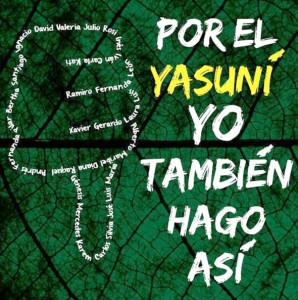EspañolLovers of nature and its protection won’t find the name Yasuní ITT (Ishipingo-Tambococha-Tiputini) unfamiliar. Located in the Ecuadorian Amazon, Yasuní ITT is an area of approximately 982,000 hectares and one of the most biodiverse places on the planet.
But under all this natural paradise, there is something else, something apparently more precious: oil. After the failed Correa initiative to keep the oil underground in exchange for international compensation, in August of 2013 the president announced his decision to extract the oil “affecting only a small part of the reserve.”
The millions of barrels of oil that lie under the Yasuní ITT are the apple of discord between Correa and a group called “Yasunidos.” While Correa has ordered the extraction of the oil, Yasunidos advocates keeping it underground to preserve the biodiversity.
Yasunidos for Life
This group of young people broke onto the public stage when Correa announced the exploitation of oil under Yasuní ITT, and they have captured the attention of the national and international community. The mayor of Lago Agrio, clearly supporting the group, said they need the “cooperation and work of the whole the country, of the big cities.”
The Yasunidos began in August 2013 with a campaign to submit the extraction of oil in the Yasuní to a referendum. By April 12, 2014, the group must collect 600,000 signatures of support, so the question “Do you agree to the Ecuadorian government keeping the oil in ITT, known as Block 4, indefinitely under the ground?” proceeds to popular approval.
But it was not until after the local elections on February 22 that the group gained momentum, as they have almost 500,000 signatures. Dozens of people have been placed in strategic locations in the most important cities in the country to collect signatures: “After voting, the turnout of people who wanted to sign was massive; on election day alone we collected 10,000 signatures, which shows that this process of extracting oil from Yasuní is rejected,” said Patricia Carrión, spokeswoman for Yasunidos.
Stones in Environmentalists’ Shoes
Meanwhile, there has been another campaign by several mayors of the ruling party in the Amazon region who do support the decision to extract the oil. Their proposal also seeks a referendum, but for directing the resources obtained through the extraction towards community aid. The question would be: “Do you support President Rafael Correa in his proposal for the exploitation of oil … and that the funds obtained from the extraction of oil from block 43 be directed towards poverty reduction, environmental protection of the country, funding of life plans for ancestral communities, and the provision of basic services?”
Coincidentally, the forms used by the mayors to collect signatures have an almost identical design to that used by Yasunidos for their campaign. “There is a hijacking of our campaign by using this type of form. It is clear that it is an action against Yasunidos. They’re trying to prevent the referendum from happening,” Antonella Calle, member of Yasunidos, denounced yesterday.

On the other hand, with only one month before the deadline for submitting signatures, the Yasunidos have ratcheted up their efforts to collect signatures. One of the mechanisms used has been the circulation of the form in print media of wide, national circulation. The design of this brochure, according to Yasunidos, was approved by the National Electoral Council. However, shortly after its circulation, the president of the Council, Domingo Paredes, said the size and design was different from the approved version.
On Friday, March 14, David Mármol, member of the group, saw that the presidential motorcade was passing by, and made the thumbs-down sign. A few minutes later, in an act of flagrant intimidation, the presidential guard arrested him. The “crime”: showing his thumb down to the presidential motorcade.
Rafael Correa: “The Decision Has Been Made”
As if this was not enough, last Saturday, President Correa, during his Citizen Link number 365, said it is highly unlikely that the proposal of Yasunidos will succeed, not only because they will struggle to gather the necessary signatures, but because he has already decided on the exploitation of oil in the ITT. “In matters like this,” he stated, “it is my prerogative to decide.”
Given the clear position of the president and his allies, a scenario may arise in which Yasunidos are weakened fast. The government will resume massive propaganda to convince the people that the exploitation of oil is be the best thing that can happen, that it will produce money and eradicate poverty – but at this point, trying to convince us of that would be to underestimate us.
The government should be candid and accept responsibility for oil exploitation’s shortcomings. Years of oil extraction have not ended poverty in Ecuador. Before Correa, the argument was that oil didn’t benefit the country, as oil concessions to international companies were given away through appalling negotiations that only benefited them. However, since the state assumed the activity of oil extraction, the quality of life for the people — especially those living in the Amazon who are victims of the harmful consequences of oil extraction — has not changed.
President Correa has declared that he is above society by announcing that his decision on the reserve has already been made. His efforts to continue now will involve, no doubt, more populism, more state interference in the lives of Ecuadorians, more corruption, and an increase in public spending. Not only will the flora and fauna be adversely affected, but too will the lives of Ecuadorians.
 Versión Español
Versión Español












